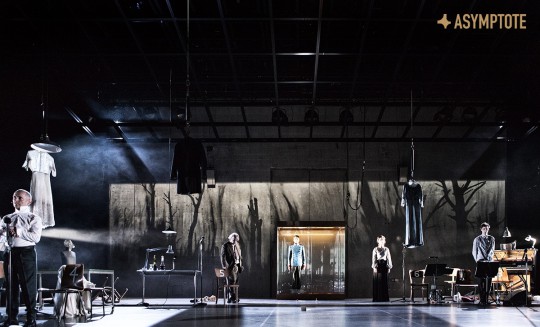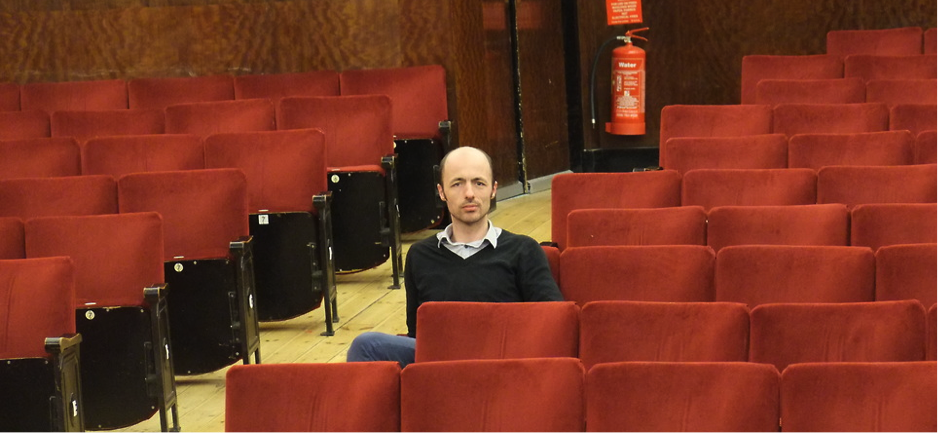Lars Eidinger, playing Richard III, huskily whispers some German lines of Shakespeare into an amplifier, furtively glances up to the English surtitles, and spins round to berate a coughing audience member in French. This is theatre in a truly globalised arts scene. But the multilingual nature of many recent productions not only reflects the realities of our contemporary social conditions. It raises fundamental questions about the nature and role of the linguistic mediation of culture today.
Posts filed under 'opera'
On Surtitles and Simultaneities: Reflections on the German Theatre Scene

No longer before, behind, or above the original, with surtitles, the translation is now parallel or simultaneous to it.
Weekly Dispatches from the Frontlines of World Literature

The latest news from our word-nerds in Finland, Cuba, and Morocco!
Contributor Hanna Heiskanen checks in from Finland:
Over in Finland, several prominent authors have expressed their concern for the writing skills of today’s young people. What began as a Facebook post by Anja Snellman, who has written more than 20 novels and is a recipient the Pro Finlandia Medal, on the quality of the letters she receives from school children around the country, has since been echoed by Salla Simukka and Pasi Ilmari Jääskeläinen, authors of the Snow White Trilogy (Hot Key Books/Amazon Children’s Publishing) and The Rabbit Back Literature Society (Pushkin Press/Thomas Dunne), respectively. Children and teenagers appear to struggle with understanding metaphor and long sentences, and are increasingly unable to write in literary, rather than spoken, language, the authors said. Reading is still generally held in high regard in the country, with 50 million books borrowed from libraries by the 5 million strong population in 2014, though these figures have been in decline.
The national broadcaster YLE shines a light on Elina Ahlbäck, the founder and director of the Elina Ahlback Literary Agency. The eight-year-old agency is behind the string of success stories of the aforementioned Salla Simukka who, like Maria Turtschaninoff, also represented by Ahlbäck, signed a Hollywood film deal some months back. Other good news for the agency is the recent nomination of Laura Lindstedt’s Oneiron for the Nordic Council’s 2017 literature prize, the winner of which will be announced in November. Finnish literature in translation is having a moment, according to Ahlbäck: “Finland is an undiscovered treasure trove, and a source of unique stories and storytelling,” she says in the article. The country still lags behind its western neighbour, however, when it comes to marketing efforts: more than 30 agencies work to export Swedish literature, now a familiar sight on global bestseller lists.
The literature festival Helsinki Lit has published its schedule for this year. The event, May 12-13, will feature discussions with the likes of Orhan Pamuk, Linda Boström Knausgård, and Laurent Binet.
And to wrap up on a more unusual note, a Danish crime literature festival has gained nationwide interest for an advertising campaign gone awry. The Krimimessen festival, the largest of its kind in the Nordic countries and organised earlier this month, was advertised by staging fake crime scenes using fake human bodies. After, naturally, distressed reactions from the general public, the campaign was promptly terminated. “I am horribly sorry”, said the organising town’s Mayor, according to the Copenhagen Post Online.
Podcast: Play in new window | Download
Subscribe: iTunes | Android | RSS
Starting off the new year fresh, we’re taking a look at opera, an art form that purports to have it all: poetry, music, costumes, and lots of drama. Opera in translation is ubiquitous, and what originally started as a private performance for Florentine nobles quickly spread beyond the palace walls and around the world with the aid of translation. With so much going on, translating opera is a multimodal undertaking. Our new podcast editor Dominick Boyle talks with Lucile Desblache, a professor at the University of Roehampton in London who led the project Translating Music. She guides us through the history of opera, explaining that translation has been there all along—just in different costumes. We also talk to Amanda Holden, a practicing opera translator who specializes in creating sung translations. She talks about how our image of opera as a boring and staid art form is a problem of translation, and how its true power can be revealed. With enough twists and turns to fill an opera, this is the Asymptote podcast.
Podcast Editor and Host: Dominick Boyle
Music provided under a Creative Commons license from freemusicarchive.com and copyright free from museopen.org and europarchive.org.
English without Pain

An interview with Thomas Smetryns on his untraditional, comic opera made with English language-learning records
Belgian composer Thomas Smetryns wrote one third of Triptych, a new opera commissioned and created by Opera Erratica. His piece A Party uses the English language-learning records L’anglais sans peine from 1950s France as the basis for an absurdist comedy.
How did you come across the L’anglais sans peine records?
I DJ with 78rpm records with a friend, and I was always looking for new material, because we didn’t want to only play the regular Bing Crosby and Andrews Sisters songs. I found the German-language records first and then I started to look for them, especially, and collect them. They’re all from the 1950s because they stopped producing 78rpm at the end of the 1950s.
How did you choose which records to use in A Party, your section of Triptych?
I was quite fascinated by L’anglais sans peine because there is a lot of material, it had the book with it, and because it was just quite funny. The accents of the records… the way they pronounce the words, as a Belgian I find them very refined, but for Patrick and other native speakers they are funny just because it’s a very old-fashioned way of talking.
I had already transcribed the whole record, so when Patrick [Eakin-Young, director and co-librettist] and I were trying things out for Triptych, I said he should take a look at it. He was completely enthusiastic, so from then on it went really fast, I think two weeks later I got the first draft of the libretto from him.

